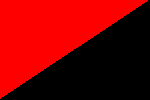CLASS STRUGGLES IN AFRICA
Swaziland: general strike for
democracy
On March 2, the 83,000-strong Swaziland Federation
of Trade Unions (SFTU) ended an incredible 28 general strike after
the government released four imprisoned union leaders. It was part of
an ongoing, union-led struggle for basic democratic rights in
Swaziland.
The strike began with a two day stay-away to force the government
to introduce basic democratic rights in Swaziland. The government's
reply was to arrest four union leaders on the eve of the strike.
Although the strike was eventually called off, workers have promised
monthly two-day strikes to force change. The union leaders are
currently suing for wrongful arrest. An important development in the
strike was international support: COSATU, for example, organis-ed
rallies and border blockades, whilst the International Confed-eration
of Free trade Unions called for protests from its members in 137
countries.
Swaziland is the only country in southern Africa that does not
allow multi-party politics. Instead, it is ruled by King Mswati II on
the basis of a 1973 royal decree that suspended the constitution. All
members of parliament are elected in non-party polls, and cabinet is
handpicked.
THE "SWAZI WAY"?
This is justified on the grounds that it is supposedly the "Swazi
way". The king's massive land holdings and support for reactionary
"chiefs" is "justified" in the same way. So-called "tradition" is
used to force peasants to work for the chiefs (and the king) for free
on certain occasions, and pay various dues the rest of the time. The
chiefs are responsible for all local government functions, including
crime, taxes and land allocation. The outcome is that the peasan-try
is denied basic democratic rights as they are under the absolute rule
of the chiefs. Indeed, this control over the peasantry was central to
the Imbokodvo National Movement (the traditionalist party aligned to
the king) taking power in the decolonisation process in the face of
its pan-Africanist rivals. Clearly, the power of the chieftancy must
be challenged in any struggle for democracy.
Still, the king's apparent love of "tradition" has not stopped him
using modern weapons against strikers. Nor has it stopped him
pandering to racist White farm-ers and employers, often
ex-"Rhodesians". Since the late 1800s, White farmers have been
prominent in Swaziland- today they are based either on private-ly
owned land, or on "Swazi Nation" land leased from the king. In
practical terms, the chiefs, White farmers and inter-national
companies are allies in search for profit and power over peasants and
workers.
WORKER MILITANCY
Unfortunately for the king, many ordinary Swazi working and poor
people reject his self-serving definition of "Swazi". This is shown
by massive struggles from below for democratic reform in the 1990s.
Banned parties like the Peoples United Democratic Movement (PUDEMO)
and the trade unions have been central to this struggle.
In January 1994, the SFTU launched a 2-day general strike in
support of 27 demands for more union rights, affirmative action, and
basic political rights. This was followed by a strike wave that
rocked shop-floors across the country. Most were successful. However,
the government failed to take negotiations over the 27 demands
seriously. In January 1996, a general strike for 8 days around
basically the same issues which was met by widespread repression.
Still, the government again agreed to start political reforms, but
again nothing happened.
4 WEEKS
The 1997 general strike is the longest strike in the country's
history. It is the latest battle in a struggle that will continue as
long as the workers demands are not met. Clearly, workers will have
to prepare for a hard struggle. The key to success is grassroots
organising, and build-ing alliances with the peasantry, the
unemployed and the informal sector. Important steps in this direction
took place in 1996, when market women in particular played a
important role. Equally important will be international worker and
union aid. No alliances should be made with local bosses- they are a
central part of the problem. Ultimately, the struggle for a fully
democratic society will require workers, peasants and the poor taking
power in their own name, establishing a stateless socialist society
(anarcho-syndicalism).

This page hosted by  Get your own
Free Home Page
Get your own
Free Home Page
 Go to the
CapitolHill GeoPage
Go to the
CapitolHill GeoPage